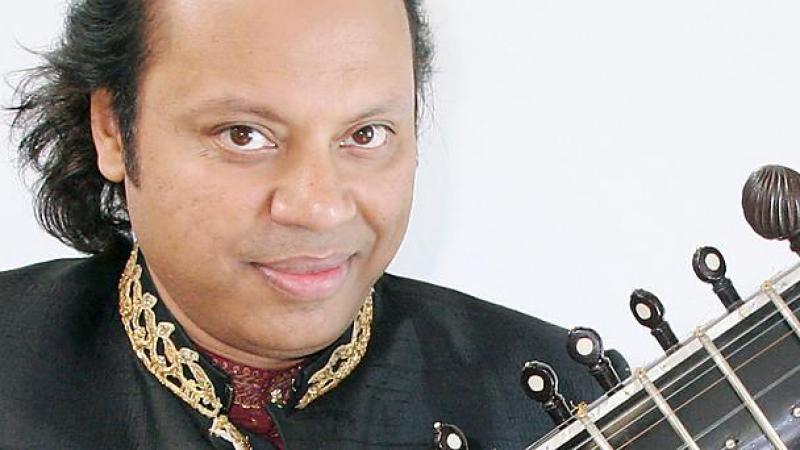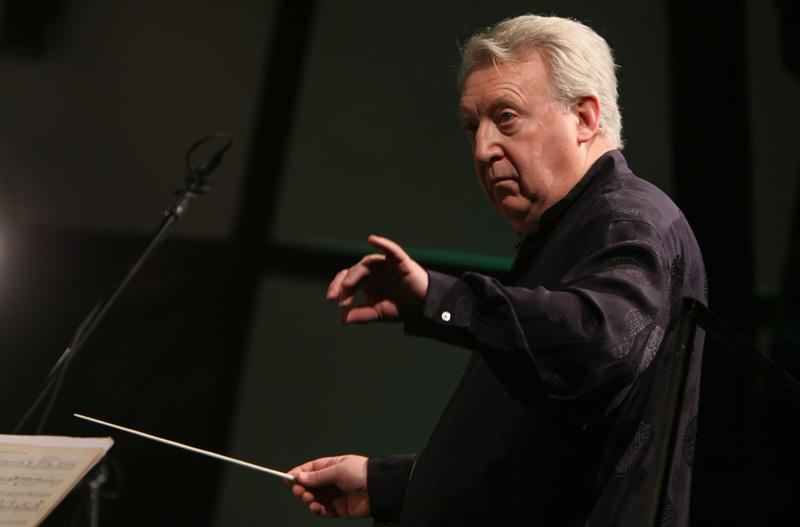Prom 39: Khan, BBC National Orchestra of Wales, Atherton | reviews, news & interviews
Prom 39: Khan, BBC National Orchestra of Wales, Atherton
Prom 39: Khan, BBC National Orchestra of Wales, Atherton
Eastern promise is never quite fulfilled in a new fusion concerto for sitar and orchestra

The fascination of the East has been a constant in classical music’s history, from the jangling sounds of the Janissary bands to Mozart’s Seraglio, Sheherazade’s dreamy tales to Britten’s seductive gamelan. Last night’s Prom gave the East a chance to answer back, setting Nishat Khan’s new Sitar Concerto in dialogue with Vaughan Williams’s London Symphony – a musical portrait of a landscape rather closer to home.
Getting us into the mood, Holst’s short tone poem Indra was something of an oddity. Anyone expecting swirling Orientalist fantasy would have been disappointed by the rather anonymous harmonic palette, conjuring the spirit of India but certainly not aping its sound-world. Holst’s textures, liquid with harps and high woodwind, have more in common with Bruckner than with anything more exotic, but the result is pleasantly ardent without having much by way of narrative or thematic focus. The BBC National Orchestra of Wales gave it the heft its rather disproportionate climaxes demand, stirred into passions by the ever-animated David Atherton.
Khan's concerto is less structurally satisfying than Shankar's and rather more conservative
Nishat Khan’s new Sitar Concerto offered an altogether more meditative engagement with India. This sitar legend (just the latest in a dynasty of great musicians in his family) is a familiar face at the Proms, but he has never before appeared as both composer and soloist. The concerto itself follows in the footsteps of Ravi Shankar’s concerto, marrying the textures and techniques of Indian classical music with the instrumentation and symphonic structure of western music.
If the result is less structurally satisfying than the Shankar (and markedly more conservative in its musical language) it’s still a very attractive work, and one animated by the virtuosity of Khan himself as soloist. The work dares to grow slowly, coiling outwards and upwards from a double bass ostinato that undulates through much of the first movement, which accumulates rather than develops its motifs. It’s all mesmerically simple, rocking the listener back and forth until the sitar dances into the fray in a jangle of metallic brilliance.
 The second movement is brighter, lighter, picking up on the energy that emerged in the earlier exchanges between solo instruments and the sitar. Dance is dominant here, with gentle rhythmic games keeping our ears uncertain through the patterning and repatterning of the raga-like scalic themes that offer Khan’s most overt colliding of East and West. The groove of this central episode however is cut short by the ferocity of the final movement (a brilliant showcase for BBC NOW’s brass section), which grows to a frenzied cadenza for sitar. Only here did Atherton’s control waver, allowing his ensemble to rock ever so slightly. But it was a momentary lapse, and we soon found ourselves whisked into an emphatic final chord. It's an appealing fusion, but the concerto’s weakness is that in taking from two musical cultures Khan has had to simplify both dramatically. The result is enjoyable, but inevitably dilutes the traditions and musical histories it references.
The second movement is brighter, lighter, picking up on the energy that emerged in the earlier exchanges between solo instruments and the sitar. Dance is dominant here, with gentle rhythmic games keeping our ears uncertain through the patterning and repatterning of the raga-like scalic themes that offer Khan’s most overt colliding of East and West. The groove of this central episode however is cut short by the ferocity of the final movement (a brilliant showcase for BBC NOW’s brass section), which grows to a frenzied cadenza for sitar. Only here did Atherton’s control waver, allowing his ensemble to rock ever so slightly. But it was a momentary lapse, and we soon found ourselves whisked into an emphatic final chord. It's an appealing fusion, but the concerto’s weakness is that in taking from two musical cultures Khan has had to simplify both dramatically. The result is enjoyable, but inevitably dilutes the traditions and musical histories it references.
Vaughan Williams’s London Symphony also has its fair share of historical nods and backward glances. Despite an astonishing lack of hush from a more than usually fractious Proms audience, Atherton (pictured above) kept his nerve, allowing the opening to unfold as more of a musical thought than an actual utterance. Whistler-esque shadows coalesced into brassy joy for the folk-popular melody for full orchestra, with the BBC NOW making the most of the release. The Lento suffered from some smudgy work from the horns (including a solo phrase blotted by exactly the same intonation issue twice), but the brass did redeem themselves handsomely in the final movement, with trombones in particular adding evocative inkiness to this night-time urban scene.
It was a fine performance and a vivid one, but despite Atherton’s efficiency and his evident rapport with the BBC NOW (surely one the best of the BBC orchestras), I couldn’t help but find myself missing Richard Hickox. Timbrally Atherton might just have the edge, but there was no arguing with the dash and drive of Hickox’s journey through the capital – that was a real thrill-ride.
rating
Share this article
The future of Arts Journalism
You can stop theartsdesk.com closing!
We urgently need financing to survive. Our fundraising drive has thus far raised £49,000 but we need to reach £100,000 or we will be forced to close. Please contribute here: https://gofund.me/c3f6033d
And if you can forward this information to anyone who might assist, we’d be grateful.

Subscribe to theartsdesk.com
Thank you for continuing to read our work on theartsdesk.com. For unlimited access to every article in its entirety, including our archive of more than 15,000 pieces, we're asking for £5 per month or £40 per year. We feel it's a very good deal, and hope you do too.
To take a subscription now simply click here.
And if you're looking for that extra gift for a friend or family member, why not treat them to a theartsdesk.com gift subscription?
more Classical music
 Bizet in 150th anniversary year: rich and rare French offerings from Palazzetto Bru Zane
Specialists in French romantic music unveil a treasure trove both live and on disc
Bizet in 150th anniversary year: rich and rare French offerings from Palazzetto Bru Zane
Specialists in French romantic music unveil a treasure trove both live and on disc
 Scottish Chamber Orchestra, Ibragimova, Queen’s Hall, Edinburgh review - rarities, novelties and drumrolls
A pity the SCO didn't pick a better showcase for a shining guest artist
Scottish Chamber Orchestra, Ibragimova, Queen’s Hall, Edinburgh review - rarities, novelties and drumrolls
A pity the SCO didn't pick a better showcase for a shining guest artist
 Kilsby, Parkes, Sinfonia of London, Wilson, Barbican review - string things zing and sing in expert hands
British masterpieces for strings plus other-worldly tenor and horn - and a muscular rarity
Kilsby, Parkes, Sinfonia of London, Wilson, Barbican review - string things zing and sing in expert hands
British masterpieces for strings plus other-worldly tenor and horn - and a muscular rarity
 From Historical to Hip-Hop, Classically Black Music Festival, Kings Place review - a cluster of impressive stars for the future
From quasi-Mozartian elegance to the gritty humour of a kitchen inspection
From Historical to Hip-Hop, Classically Black Music Festival, Kings Place review - a cluster of impressive stars for the future
From quasi-Mozartian elegance to the gritty humour of a kitchen inspection
 Shibe, LSO, Adès, Barbican review - gaudy and glorious new music alongside serene Sibelius
Adès’s passion makes persuasive case for the music he loves, both new and old
Shibe, LSO, Adès, Barbican review - gaudy and glorious new music alongside serene Sibelius
Adès’s passion makes persuasive case for the music he loves, both new and old
 Anja Mittermüller, Richard Fu, Wigmore Hall review - a glorious hall debut
The Austrian mezzo shines - at the age of 22
Anja Mittermüller, Richard Fu, Wigmore Hall review - a glorious hall debut
The Austrian mezzo shines - at the age of 22
 First Person: clarinettist Oliver Pashley on the new horizons of The Hermes Experiment's latest album
Compositions by members of this unusual quartet feature for the first time
First Person: clarinettist Oliver Pashley on the new horizons of The Hermes Experiment's latest album
Compositions by members of this unusual quartet feature for the first time
 Gesualdo Passione, Les Arts Florissants, Amala Dior Company, Barbican review - inspired collaboration excavates the music's humanity
At times it was like watching an anarchic religious procession
Gesualdo Passione, Les Arts Florissants, Amala Dior Company, Barbican review - inspired collaboration excavates the music's humanity
At times it was like watching an anarchic religious procession
 Classical CDs: Camels, concrete and cabaret
An influential American composer's 90th birthday box, plus British piano concertos and a father-and-son duo
Classical CDs: Camels, concrete and cabaret
An influential American composer's 90th birthday box, plus British piano concertos and a father-and-son duo
 Cockerham, Manchester Camerata, Sheen, Martin Harris Centre, Manchester review - re-enacting the dawn of modernism
Two UK premieres added to three miniatures from a seminal event of January 1914
Cockerham, Manchester Camerata, Sheen, Martin Harris Centre, Manchester review - re-enacting the dawn of modernism
Two UK premieres added to three miniatures from a seminal event of January 1914
 Kempf, Brno Philharmonic, Davies, Bridgewater Hall, Manchester review - European tradition meets American jazz
Bouncing Czechs enjoy their Gershwin and Brubeck alongside Janáček and Dvořák
Kempf, Brno Philharmonic, Davies, Bridgewater Hall, Manchester review - European tradition meets American jazz
Bouncing Czechs enjoy their Gershwin and Brubeck alongside Janáček and Dvořák
 Solomon, OAE, Butt, QEH review - daft Biblical whitewashing with great choruses
Even a top soprano and mezzo can’t make this Handel paean wholly convincing
Solomon, OAE, Butt, QEH review - daft Biblical whitewashing with great choruses
Even a top soprano and mezzo can’t make this Handel paean wholly convincing

Add comment